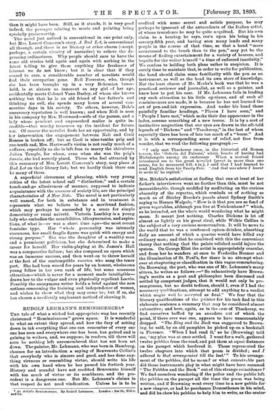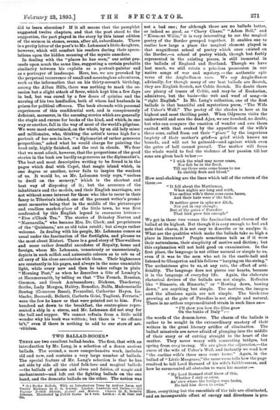RUDOLF LEHHANN'S REMINISCENCES"
THE tale of what a wicked but appropriate wag has recently christened " Reminuisances" grows apace. It is wonderful to what an extent they spread, and how the fury of setting down in ink everything that one can remember of every one one has seen and everywhere one has been, has gained and is gaining in writers, and, we suppose, in readers, till there will soon be nothing left unremembered that has not been set down. The painter, Mr. Lehmann, who was born in Hamburg, chooses for an introduction a saying of Benvenuto Cellini's that everybody who is sincere and good, and has done any- thing virtuous or resembling virtue, should write his life with his own hand when be has passed his fortieth year. History and scandal have not credited Benvenuto himself with too much of virtue or its semblance, and the pre- cedent is a dangerous one. But Mr. Lehmann's claims in that respect do not need vindication. Unless he is to be
. • An Artist's Beminieeenem. By Rudolf Lehmann. London : Bm112, Elder. sad Co.
credited with some secret and satiric purpose, he may perhaps be ignorant of the antecedents of the Italian artist, of whose truculence he may be quite aequitted. But his own claim to a hearing, he says, rests upon his being in his seventy-fifth year, and having seen many lands and many people in the course of that time, so that a hand "more accustomed to the brush than to the pen," may yet be the means of finding entertainment for a variety of hearers, and beguile for the writer himself "a time of enforced inactivity." We confess to holding both pleas rather in suspicion. It is surely time to maintain that, in order to write for publication, the hand should claim some familiarity with the pen as an instrument, as well as the head its own store of knowledge.
Not the least charm of Mr. Marks's book was that he was a
practiced reviewer and journalist, as well as a painter, and knew bow to put his case. If Mr. Lehmann fails in lending any such attraction to his little egotisms, and of such all reminiscences are made, it is because he has not learned the art of pen-and-ink expression. And under his hand those painfully familiar headings, "Places I have seen," and "People I have met," which make their due appearance in the index, assume something of a new terror. It is by a sort of instinctive magnetism that our eyes are drawn to the oft-told legends of "Dickens" and "Thackeray," in the last of whom especially there has been of late too much of a "boom." And it is with a corresponding sense of relief, not free from wonder, that we read the following paragraph :—
"I only met Thackeray once, in the historical old Roman tavern, the Osteria del Falcone,' which boasts of having had Michelangelo among its customers When a mutual friend introduced me to the great novelist (great in more than one sense, for he measured 6ft. 4 in.), I said that I had learned to read English from his Vanity Fair. 'And that was where r learnt to write it,' he replied."
Mrs. Ritchie's satisfaction at finding that one at least of her father's interviewers went no further than this, must be not inconsiderable, though modified by meditating on the curious obscurity of the repartee, which reminds us of nothing so much as of Shirley Brooks's puzzle about Sydney Smith's saying to Horace Walpole, "How is it that you are so fond of green vegetables, although you live at Twickenham P" which, as he intended, set the whole world wondering what he might mean. It meant just nothing. Charles Dickens is let off almost as lightly as his great rival, while Wilkie Collins is the subject of a very curious memorandum. It will be news to the world that he was a confirmed opium-drinker, absorbing daily an amount of which a quarter would have killed any ordinary man ; and that he combined with this the convenient theory that nothing that the palate relished could injure the system. On George Eliot the artist is appropriately oracular, and from her he wanders at once to Frederika Bremer and the illumination of St. Paul's, for there is no attempt what- ever at chaptering or classification in this vague remembering. On Browning, the poet, who was one of Mr. Lehmann's many sitters, he writes as follows :—" So exhaustively have Brown- ing's merits as a poet and philosopher, been discussed and settled by competent judges, that it would not only be pre-
sumptuous, but no doubt tedious, should I, even if I had the necessary eaall fications, attempt to add anything to a verdict which might well Lir accented as final." We fear that the literary qualifications of the pginter for his task find in this
elaborate sentence a summary that. may be considered almost exhaustive; and here, again, as in the ease of Thackeray, ws
find ourselves baffled by an anecdote cut of which the point, if there ever was one, appears to have unaccountably dropped. "The Bing and the Book was suggested to Brown- ing. he said, by an old pamphlet he picked up on a bookstall
in Florence. • When I had read it,' so he (Browning) told me, 'my plan was at once settled. I went for a walk, gathered twelve pebbles from the road, and put them at equal distances on the parapet which bordered it. Those represented the
twelve chapters into which that poem is divided ; and r adhered to that arrangement till the last.'" To his arrange-
ment of the pebbles, did he mean P or what conceivable part did those instruments play in what might have been renamed "The Pebbles and the Book" out of this strange coincidence Fs' We find ourselves wondering if the police and the public left. the pebbles on the parapet all the time the poem was being written, and if Browning went every time to a new pebble for- a new chapter, or had he perchance Demosthenes in his mind, and did he chew his pebbles to help him to write, as the orator- did to learn elocution ? If it all means that the pamphlet suggested twelve chapters, and that the poet stood to the suggestion, the part played in the story by this latest edition of the sermon in stones, seems, after all, subordinate. There is a pretty letter of the poet's to Mr. Lehmann's little daughter, however, which will comfort his readers during their specu- lations upon the hidden meaning of the mystic anecdote.
In dealing with the "places he has seen," our artist pro- ceeds upon much the same line, suggesting a certain probable similarity between his exploits as a portrait-painter and as a portrayer of landscape. Here, too, we are provoked by the perpetual recurrence of small and meaningless adventures, such as the information that on his thirty-seventh birthday, among the Alban Hills, there was nothing to mark the oc- casion but a slight attack of fever, which kept him a few days in bed, but was cured by a few doses of quinine and the nursing of his two landladies, both of whom had husbands in prison for political offences. The book abounds with personal experiences of this confidential sort, and is conspicuously deficient, moreover, in the amusing stories which are generally the staple and excuse for books of the kind, and which, in one way or another, fall in the way of most of the world's pilgrims. We were most entertained, on the whole, by an old lady miser and millionaire, who, thinking the artist's terms high for a portrait of her son-in-law, "a diplomatist of rather generous proportions," asked what he would charge for painting the head only, highly finished, and the rest in clouds. We fear that we must admit, however, that the proportions of the good -stories in the book are hardly as generous as the diplomatist's. The best and most descriptive writing to be found is in the pages which deal with Capri, that magic island which, in one degree or another, never fails to inspire the weakest of us. It would be, as Mr. Lehmann truly says, "useless to dwell on the scenery," #hich is the shortest and best way of disposing of it; but the accounts of the inhabitants and the models, and their English marriages, are not without some interest for those who like to recur in their fancy to Tiberius's island, one of the present writer's promi- nent memories being that in the middle of the picturesque and roadless market-place of the little town, he was first confronted by this English legend in enormous letters- " Five o'Clock Tea." The stories of Brinsley Norton and "Nannarella," who became Mrs. Dr. Clerk, and proprietress of the Qnisisana,' are as old tales retold ; but always rather welcome. In dealing with his people, Mr. Lehmann comes as usual under the fascination of the footlights, and pleases us the most about Ristori. There is a good story of Thorwaldsen and some rather dreadful anecdotes of Royalty, home and foreign, whom Mr. Lehmann, 'consciously or unconsciously, depicts in such selfish and autocratic colours as to rob us of all envy of his close association with them. Their highnesses are constantly in his pages, and always in the same unamiable light, while every now and then he takes refuge in plain "Morning Post," as when he aescribes a fete of Lumley's, at Hammersmith, by telling us that "The French, Russian, -German, and Greek Ambassadors ; Dickens, Thackeray, Scribe, Lady Morgan, Halevy, Benedict, Balfe, Mademoiselle Sontag (Countess Rossi), Frezzolini, Catherine Hayes, La- blache, Boccardi, Belletti, Carlotta Grisi, Taglioni, Ferraris," were the few he knew or that were pointed out to him. Five hundred sat down to the breakfast, the centre-piece repre- sented a ship in a storm, and Mr. Lehmann did not stay for -the ball and supper. We cannot refrain from a little mild wonder why his book was written ; but there is no offence in't," even if there is nothing to add to our store of art- -riticism.



































 Previous page
Previous page